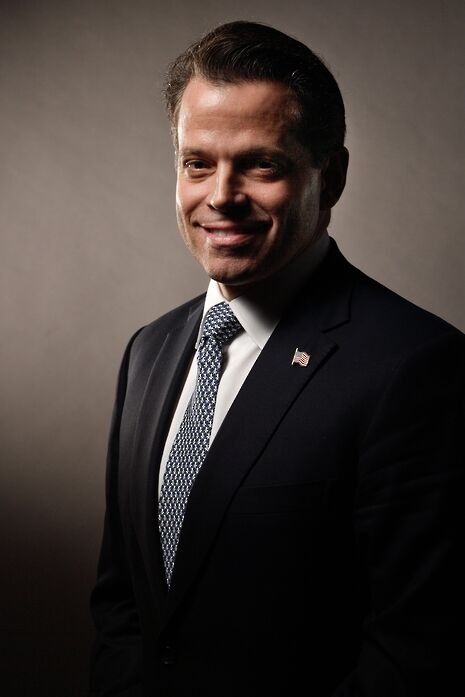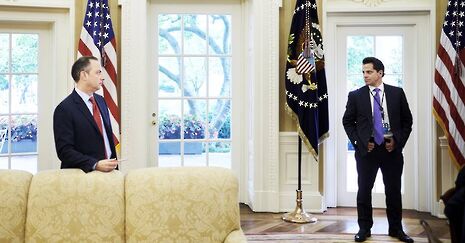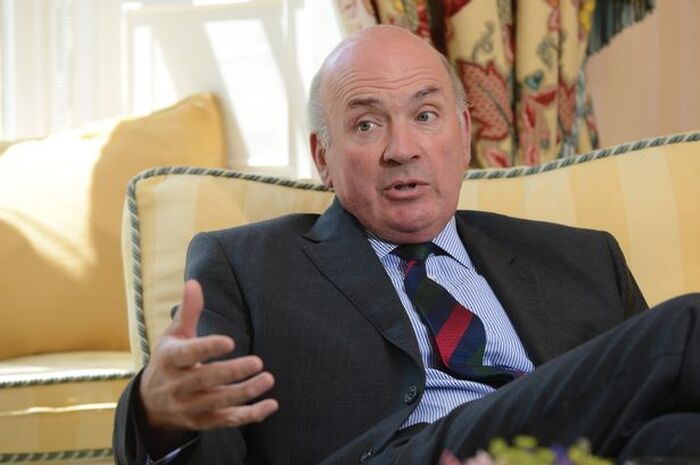Anthony Scaramucci: ‘I found the backstabbing repulsive; I’m more of a front-stabber’
Josh Kimblin meets ‘The Mooch’, the former White House Communications Director to discover more about his tumultuous ten days inside the Trump administration

With slick hair, a crisp shirt and an animal smile, Anthony ‘The Mooch’ Scaramucci dresses as though looks could kill. Having spent seven years at Goldman Sachs before founding his own investment firm, he is a former wolf of Wall Street – and he is proud of it.
Scaramucci’s fame stems from his part in the White House’s midsummer madness. After the demise of Sean ‘Spicey’ Spicer as Press Secretary, the Mooch became Trump’s Director of Communications, in a reign that was as bizarre as it was brief.
His tenure lasted only 10 days, between July 21st and 31st, before he fell victim to a wider power struggle within the Presidency.
Despite only featuring as a cameo, the Mooch’s performance was memorable. On Tuesday 25th, he declared that he would “fire everybody” to plug leaks from the White House. Two days later, he called a New Yorker journalist, Ryan Lizza, and launched an extraordinary tirade against his colleagues, whom he suspected of leaks.
Despite being the shortest-lived Communications Director ever, Scaramucci has “no regrets – zero”
He labelled Reince Priebus, the then-chief of staff and a rival for power, a “f**king paranoid schizophrenic” and declared that “I’m not Steve Bannon, I’m not trying to suck my own cock,” referring to Trump’s then-chief strategist. Scaramucci implied that Bannon was using the Presidency to advance his own media agenda.

Now, the Mooch appears calmer. He claims that the New Yorker journalist acted “outside the spirit of the relationship”. “He knew the conversation was off the record. I technically didn’t say ‘off the record’, but he used that as a political foil and it was successful.” Scaramucci was sacked four days after the phone call by the incoming Chief of Staff, retired General John Kelly.
Despite being the shortest-lived Communications Director ever, Scaramucci has “no regrets – zero”. “I’ve been very true to myself,” he remarks. “I was being open and honest.” He even extends some magnanimous comments towards Kelly, calling him “a great American” and “an unbelievable guy”, who “needed to impose order in the West Wing”.
Above all, the Mooch believes in “no whining in politics – you’ve got to dust yourself off and get on with it.” He even jokes that for his next job, his objective is to “keep a post for longer than ten days”.
Irrespective of the “no whining” policy, Scaramucci is scathing about Washington’s penchant for political intrigue. “People take two pills when they go for power,” he explains. “The anti-friendship pill, where they forget about where their friendships and loyalties were. The other pill is the aphrodisiac pill for power… People get drunk on power.”
Apparently without irony, he continues: “What I really disliked is that people would glad-hand you and pat you on the back, then they’d pick up the phone and surreptitiously leak some information about you to a reporter. That’s not serving the country; that’s sticking your own interests in front of the country.”
He suggests that the President’s tweets are intentionally provocative – “Molotov cocktails”, designed to “light the hair of the journalists biased against him”
Scaramucci offers a number of interesting insights into Trump’s mindset, drawn from his experience of the Trump campaign. When asked how he would advise the President on his Twitter usage, Scaramucci effectively surrenders responsibility.
“It doesn’t matter what my advice is, because the President is going to use Twitter in the way he sees fit. He’s seventy-one years old… he’s not going to listen to you”. If a former Communications Director admits that he can’t direct Trump’s communications, one wonders whether anybody can.
He explains that Trump regards Twitter as “the best mechanism for directly communicating with the American electorate”, cutting out traditional media. He suggests that the President’s tweets are intentionally provocative – “Molotov cocktails”, designed to “light the hair of the journalists biased against him”.
In many respects, the Mooch is a Trump Mini-Me. Both men are Long Island residents and wealthy businessmen. Like Trump, he narrates his life as an All-American success story: how he “grew up in a blue-collar neighbourhood”; how he started out with a $150,000 debt; and how he has established three businesses.
Scaramucci also shares Trump’s name-dropping habit. By the end of our conversation, he has revealed that he once had dinner with Supreme Court Justice Antonin Scalia; that he was Barack Obama’s contemporary at Harvard Law School; and that he knows Governor Scott Walker personally. So personally, in fact, that he corrects himself when he simply calls him “Scott”.
He declares that he “found the backstabbing in Washington repulsive”, before describing himself as “a front-stabber”
It’s easy to view Scaramucci as a semi-comic caricature of American capitalism. In part, he embraces the stereotype, declaring that he is “living the American Dream”. Towards the end of our interview, he cites The Great Gatsby as his favourite classic. I point out that the book is more often seen as an indictment of the Dream’s decadent downsides. He ignores the comment.
However, when asked whether he sees politics as a platform for personal ambition, Scaramucci equivocates. “I don’t know,” he replies. “I don’t think I have the right personality. I’m a very upfront person. I’m not going to sugar-coat things in that Orwellian-speak way. That will lead to some level of anxiety.”
The reference to Orwell is ironic, because Scaramucci is capable of extraordinary doublethink. He describes himself as “a huge believer in the freedom of the press” and rhapsodises about the need for the Fourth Estate as a check on power; then he attacks the “biased mainstream media”. He declares that he “found the backstabbing in Washington repulsive”, before describing himself as “a front-stabber”. He speaks passionately about the need to “drain the swamp of the last vestiges of the permanent political class”, while name-dropping his political connections.
“Most people really can’t handle the truth. They sort of want their politicians to not be so truthful.”
On one level, these contradictions are so blatant that they are funny. The Mooch is a character so colourful that he belongs in fiction. Indeed, he acknowledges the television parallels with the White House’s drama, when he suggests that “the screenwriters for The Hunger Games, House of Cards, and Game of Thrones wrote the script for ‘Washington DC’.”
This is an apposite but dangerous comparison: when we treat politicians as reality television stars, as we treat Scaramucci, we disassociate their actions from reality. We laugh anyway.
In the final moments of our interview, Scaramucci reflects on the famous courtroom scene in the film A Few Good Men, in which Jack Nicholson’s Colonel Jessup defends his order to have a marine murdered, telling his legal opponent that ‘You can’t handle the truth!’
“Most people really can’t handle the truth,” Scaramucci comments. “They sort of want their politicians to not be so truthful.”
On one level, this is another piece of bizarre doublethink. It contradicts Scaramucci’s usual argument that Trump’s election was due to the electorate’s appreciation of his authenticity and willingness to ‘speak truth to power’ to America’s elite. In another respect, however, it reveals a deeply cynical view of the electorate and a tacit admiration of dissimulation.

General Richard Dannatt: Leading From The Front
As Scaramucci ends the interview and leaves to address a full Union chamber – treated more as a celebrity than as a political figure – the phrase ‘You can’t handle the truth’ hangs in the air.
With another flash of the animal smile, both charming and lethal, the truth suddenly feels like an endangered animal – a creature entirely at the mercy of a ‘Few Good Men’ in the Trump administration
 News / Uni Scout and Guide Club affirms trans inclusion 12 December 2025
News / Uni Scout and Guide Club affirms trans inclusion 12 December 2025 News / Cambridge Vet School gets lifeline year to stay accredited28 November 2025
News / Cambridge Vet School gets lifeline year to stay accredited28 November 2025 News / Cambridge study finds students learn better with notes than AI13 December 2025
News / Cambridge study finds students learn better with notes than AI13 December 2025 Science / Did your ex trip on King’s Parade? The science behind the ‘ick’12 December 2025
Science / Did your ex trip on King’s Parade? The science behind the ‘ick’12 December 2025 News / Pembroke to convert listed office building into accom9 December 2025
News / Pembroke to convert listed office building into accom9 December 2025







